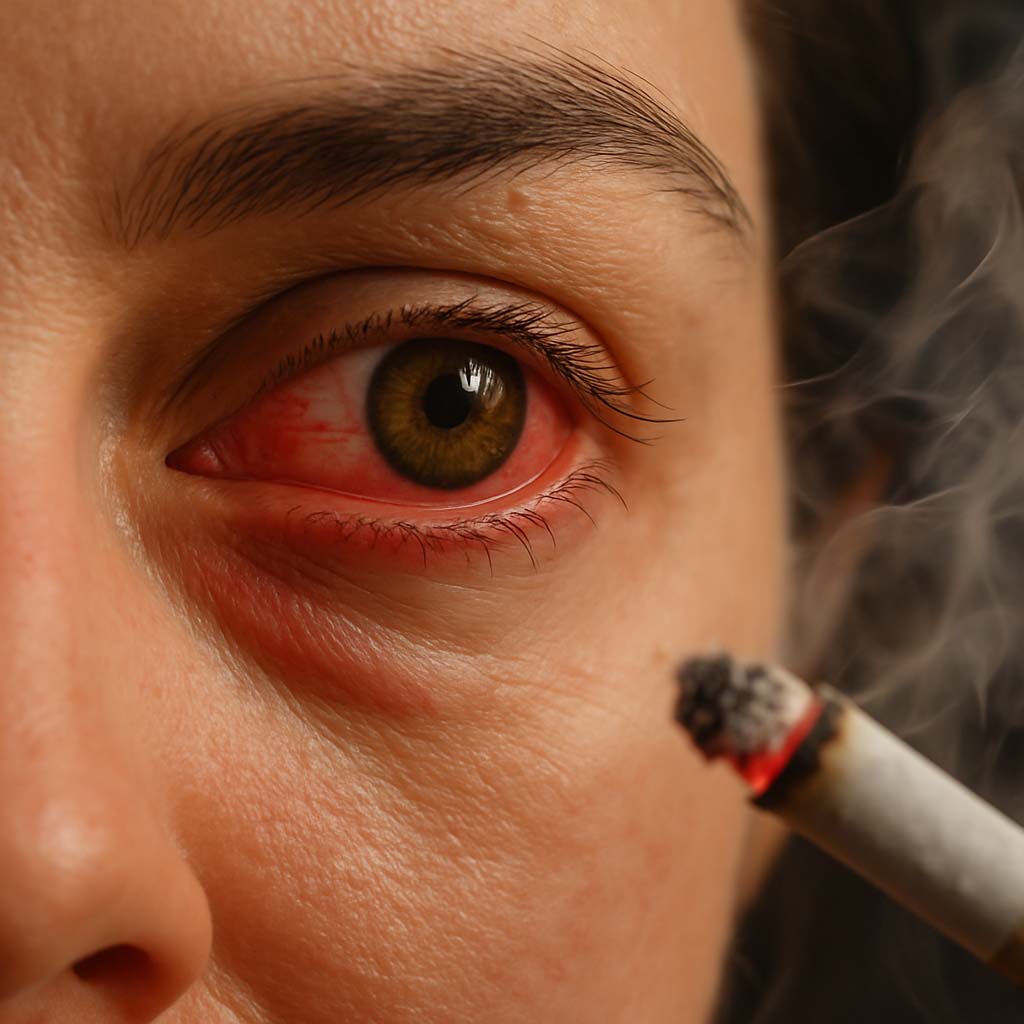Besides causing lung cancer and heart disease, overwhelming scientific evidence suggests that smoking damages the eyes. Specifically, causing premature cataracts, more aggressive diabetic retinopathy, more aggressive macular degeneration, uveitis or inflammation of the eyes, aggravation of glaucoma, and worse dry eyes syndrome. Every ophthalmologist, including Dr. Moffett, recommends to stop smoking immediately. However, quitting this gripping habit can be very difficult. A national program and hotline can be accessed at 1-800-QUIT-NOW. They have access to specialized doctors, medications, support groups, 24-hour help lines, and other tools to assist you in the challenging undertakings of quitting. Please act now to avoid further damage to your vision. If you need further information please speak to Dr. Moffet or call 208-535-4900. Sincerely, Teton Retinal Institute
Eye Diseases Related to Smoking
Age-Related Macular Degeneration (AMD)
The macula is the part of your retina responsible for sharp, central vision. Smoking is the most significant modifiable risk factor for AMD, increasing your risk up to fourfold compared to non-smokers. Smoking damages the retina by reducing blood flow, creating oxidative stress, and increasing inflammation. This leads to the growth of abnormal blood vessels that cause scarring and permanent central vision loss. Fact: People who smoke are more likely to develop AMD earlier in life, and progression is faster.
Cataracts
Cataracts occur when the eye’s natural lens becomes cloudy, resulting in blurry vision. Everyone is at risk as they age, but smoking doubles your chances of developing cataracts and makes them appear at a younger age. Smoking also increases the likelihood that you will eventually need cataract surgery. Symptoms include glare, faded colors, and trouble seeing at night.
Diabetic Retinopathy
For patients with diabetes, smoking compounds the risk of vision loss. It damages retinal blood vessels and worsens diabetic retinopathy, a leading cause of blindness. Smokers with diabetes are more likely to experience macular swelling, bleeding, and advanced complications. Managing blood sugar is critical, but avoiding smoking is equally important in protecting long-term vision.
Dry Eye Syndrome
Smoke irritates the surface of the eye and disrupts the tear film, causing burning, stinging, and excessive tearing. Smokers are more likely to develop chronic dry eye, and even secondhand smoke can trigger symptoms in children and non-smokers. Protecting your eyes from smoke exposure can improve comfort and reduce irritation.
Uveitis and Optic Nerve Damage
Research shows smoking increases the risk of uveitis, a painful inflammatory condition inside the eye that can lead to glaucoma, cataracts, and retinal swelling. Smoking also contributes to optic nerve damage by reducing blood flow, increasing the risk of glaucoma and ischemic optic neuropathy — conditions that can permanently reduce peripheral or central vision.
Symptoms to Watch For

If you smoke and notice any of these changes, schedule an eye exam right away:
- Blurry or hazy vision
- Trouble seeing in dim lighting
- Dark or missing spots in central vision
- Glare or halos around lights
- Red, irritated, or watery eyes
- Sudden loss of part of your vision
Protecting Your Vision by Quitting Smoking
It’s never too late to protect your eyesight. Quitting smoking lowers your risk for AMD, cataracts, and diabetic retinopathy, and it helps improve circulation to the optic nerve. Within 10–15 years of quitting, your risk for many eye diseases drops close to that of a non-smoker.
Other steps that help protect your eyes include:
- Eating a nutrient-rich diet with leafy greens and omega-3s
- Managing diabetes, blood pressure, and cholesterol
- Wearing UV-protective sunglasses outdoors
- Scheduling annual comprehensive eye exams
When to See a Retina Specialist
Smokers are at significantly higher risk for vision-threatening conditions. If you smoke — or have recently quit — it’s important to get regular dilated eye exams. Early detection can slow or prevent vision loss.
Frequently Asked Questions
-
How does smoking affect your eyes?
Smoking introduces thousands of harmful chemicals into your body, many of which damage the eyes. These toxins reduce blood flow and oxygen delivery to the retina, lens, and optic nerve. Over time, this increases the risk of age-related macular degeneration, cataracts, diabetic retinopathy, and optic nerve damage. Smoking also irritates the eye’s surface, making dry eye symptoms worse. Even secondhand smoke can harm eye health, especially in children and non-smokers. In short, smoking accelerates the aging process of the eye and makes vision-threatening diseases more likely.
-
Can smoking cause blindness?
Yes. While not every smoker will go blind, smoking significantly increases the risk of conditions that can lead to permanent vision loss. Age-related macular degeneration, which is strongly linked to smoking, is a leading cause of blindness in people over 50. Smoking also doubles your risk of cataracts, which cloud vision and may require surgery. In people with diabetes, smoking worsens diabetic retinopathy, a major cause of blindness. The risk is preventable — quitting smoking greatly lowers the chances of developing these diseases and helps protect your eyesight long term.
-
What eye diseases are most strongly linked to smoking?
The most common smoking-related eye diseases include:
- Age-Related Macular Degeneration (AMD): Smoking is the strongest risk factor for AMD.
- Cataracts: Smokers are more likely to develop cataracts earlier.
- Diabetic Retinopathy: Smoking worsens circulation problems in people with diabetes.
- Dry Eye Syndrome: Smoke irritates the eyes and worsens dryness.
- Glaucoma and Optic Nerve Damage: Smoking reduces blood flow to the optic nerve. These conditions can all lead to vision loss if untreated, making smoking a major threat to eye health.
-
If I quit smoking, will my risk for eye disease go down?
Yes. The sooner you quit smoking, the more you protect your eyes. Research shows that quitting lowers your risk of AMD and cataracts, and improves circulation to the retina and optic nerve. Within 10–15 years of quitting, your risk for many smoking-related eye conditions is close to that of someone who has never smoked. Quitting also helps control blood sugar and blood pressure, which are critical for eye health in people with diabetes. Even if you’ve smoked for many years, it’s never too late to benefit — your eyes and overall health begin improving as soon as you stop.
-
Can secondhand smoke harm eye health?
Yes. Secondhand smoke contains many of the same toxic chemicals inhaled by smokers and can irritate the eyes of non-smokers. It’s especially harmful to children, who may develop dry eye symptoms, irritation, and increased risk of asthma and other health issues. In adults, frequent exposure to secondhand smoke can worsen dry eye syndrome and increase long-term risk for eye disease. Avoiding smoke-filled environments and maintaining smoke-free homes helps protect the vision and overall health of your family.
-
What symptoms should smokers watch for?
Smokers should be alert to early vision changes, which can signal the beginning of smoking-related eye disease. Symptoms include:
- Blurry or hazy vision
- Difficulty seeing in dim light
- Dark or empty spots in central vision
- Glare or halos around lights
- Persistent red or irritated eyes
- Sudden partial loss of vision
If you notice any of these symptoms, schedule a comprehensive eye exam immediately. Early diagnosis offers the best chance of slowing or preventing vision loss.
-
How can I protect my eyes if I smoke or recently quit?
The most effective way to protect your eyes is to quit smoking altogether. In addition, schedule regular dilated eye exams, eat a diet rich in leafy greens and omega-3s, manage blood pressure and diabetes, and wear sunglasses outdoors to block harmful UV rays. If you’ve recently quit smoking, these healthy habits can further lower your risk of vision loss. Partnering with a retina specialist for regular monitoring ensures that any early signs of disease are detected and treated quickly.

Protect Your Eyesight Today
If you smoke, your eyes are at risk. Regular eye exams are the best defense against vision loss from AMD, cataracts, and other smoking-related eye diseases.
Schedule Your Eye Exam or call 208-535-4900 to book an appointment with Teton Retinal Institute.
